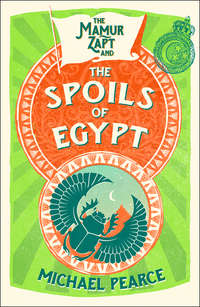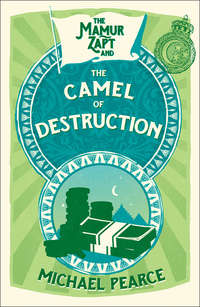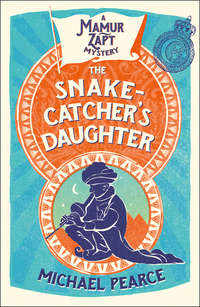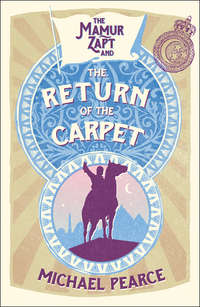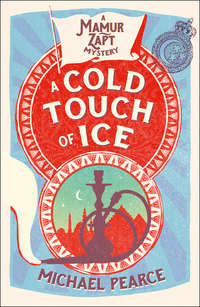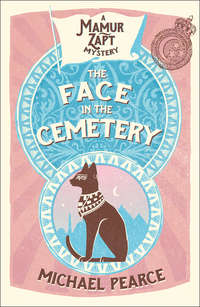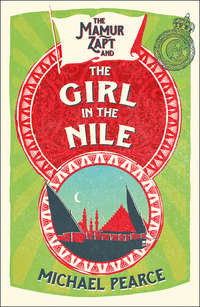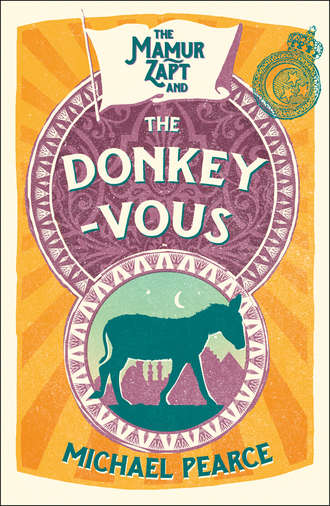
Полная версия
The Mamur Zapt and the Donkey-Vous
The restaurant was a circular tray, about a yard and a half across, with rings of bread stuck on nails all round the rim and little blue-and-white china bowls filled with various kinds of sauces and pickles taking up most of the middle, the rest being devoted to unpromising parts of meat hashed up in batter. The donkey-boys in fact usually preferred their own bread, which looked like puffed-up muffins, but liked to stuff it out with pieces of pickle or fry. They offered some to Mahmoud as he squatted beside them.
‘Try that!’ they invited. ‘You look as if you could do with a good meal.’
Mahmoud accepted politely and dipped his bread in some of the pickle.
‘You can have some too if you like,’ they said to Owen. ‘That is, unless you’re eating up there.’
‘Not for me. That’s for rich people.’
‘You must have a piastre or two. You’re English, aren’t you?’
‘Welsh,’ said Mahmoud for Owen.
‘What’s that?’
‘Pays Galles,’ said a knowledgeable donkey-boy. Many of them were trilingual.
This sparked off quite a discussion. Several of them had a fair idea of where Wales was but there were a lot of questions about its relation to England.
‘They conquered you, did they?’
‘It was a long time ago.’
‘It’s hard being a subject people,’ they commiserated. ‘We should know! Look at us!’
‘The Arabs.’
‘The Mamelukes.’
‘The Turks.’
‘The French.’
‘The British.’
‘We’ve had a lot of rulers,’ someone said thoughtfully. ‘When’s it going to end?’
‘Very soon, if the Nationalists have it their way,’ said someone else.
That set off a new round of discussion. Most of the donkey-boys were broadly in sympathy with the Nationalist movement but one and all were sceptical about its chances of success.
‘They’re the ones with the power,’ said somebody, gesticulating in the direction of the terrace, ‘and they’re not letting it go.’
‘They’ve got the guns.’
‘And the money.’
‘At least we’re getting some of that,’ said someone else.
‘You’re doing all right, are you?’ asked Mahmoud.
‘Not at the moment we’re not.’
‘When the next ship gets in we’ll be all right,’ said someone.
‘When a new lot arrive at the hotel,’ one of the donkey-boys explained, ‘the first thing they do is come down to us and have their pictures taken with the donkeys.’
‘For which we charge them.’
‘It’s better than hiring them out for riding. You don’t tire out the donkeys.’
‘Or yourself,’ said someone.
There was a general laugh.
‘The children are best.’
‘It’s a bit late in the year for them, though,’ said someone.
‘Not too busy, then, today?’ suggested Mahmoud.
‘Busy enough,’ they said neutrally. The donkey-boys did not believe in depreciating their craft.
‘There’s been a lot of excitement up there today,’ one of them said.
‘Oh?’
‘They’ve lost someone.’
All the donkey-boys laughed.
‘It’s easy enough for these foreigners to lose themselves in the bazaars,’ said Mahmoud.
‘Oh, he didn’t lose himself in the bazaars.’
‘No?’
‘He lost himself on the terrace.’
There was a renewed burst of laughter.
‘Get away!’
‘No, really! There he was, sitting up on the terrace as bold as life, and then the next minute, there he wasn’t!’
Again they all laughed.
‘You’re making this up.’
‘No, we’re not. That’s how it was. One minute he was there, the next he wasn’t.’
‘He just walked down the steps?’
‘Him? That old chap? He couldn’t even fall down them.’
‘He went back into the hotel.’
‘They can search all they like,’ said someone, ‘but they won’t find him there.’
‘You’ve got me beat,’ said Mahmoud. ‘Where is he, then?’
‘Ah!’
‘Try the Wagh el Birket,’ someone suggested.
They all fell about with laughter. The Sharia Wagh el Birket, which was just round the corner, was a street of ill-repute.
‘If you don’t find him there,’ said someone, ‘you’ll find every other Frenchman in Cairo!’
‘And Englishman, too!’
‘But not Welshman,’ said someone kindly.
‘They know something,’ said Owen.
‘Yes.’
Owen and Mahmoud were sitting wearily at a table on the terrace. It was after eleven and the hotel manager had just sent them out some coffee. The night was still warm and there were plenty of people still at the tables. Across the road they could see the brightly-coloured lamps of the Ezbekiyeh Gardens but here on the terrace there were fewer lights. There was just the occasional standard lamp, set well back from the tables because it drew the insects, which circled it continuously in a thick halo. Because of the relative darkness, the stars in the yet unpolluted Egyptian sky seemed very close, almost brushed by the fringed tops of the palms. The air was heavy with the heady perfume of jasmine from the trays which the flower-sellers held up to the railings for inspection. Some women went past their table and another set of perfumes drifted across the terrace. In the warm air the perfumes gathered and lingered almost overwhelmingly.
Owen watched the light dresses to the end of the terrace. There was a burst of laughter and chatter as they reached their table and the scrape of chairs. Someone called for a waiter, a suffragi came hurrying and a moment later waiters were scurrying past with ice-buckets and champagne. A cork popped.
The railings were still crowded with vendors and the crowd in the street seemed as thick as ever. Every so often an arabeah would negotiate its way through and deposit its passenger at the foot of the hotel steps. Then it would join the row of arabeahs standing in the street. The row was growing longer. There were few outward journeys from the hotel now.
The donkey-boys had stopped all pretence of expecting business and were absorbed in a game they played with sticks and a board. They threw the sticks against the wall of the terrace and moved broken bits of pot forward on the board depending on how the sticks fell. The scoring appeared to be related to the number of sticks which fell white side uppermost. The dark sides didn’t seem to count unless all the sticks fell dark side uppermost, which was a winning throw.
‘Yes,’ said Mahmoud, ‘they know something. But how much do they know?’
‘They know how he disappeared.’
‘Yes,’ Mahmoud admitted, ‘they might know that.’
‘They said he didn’t come down the steps.’
‘They didn’t quite say that. Anyway, I believe the snake-charmer.’
‘The charmer said the old man had been helped down. We haven’t been able to find anyone who helped him.’
‘Not on the hotel staff. It might have been a guest.’
‘We could ask around, I suppose. It won’t be popular with the hotel.’
‘A crime has been committed,’ Mahmoud pointed out. When in pursuit of his duties, he was not disposed to make concessions.
‘We don’t know that yet.’
‘At least we could try the ones on the tables nearest him.’
‘If we could find out who they were.’
‘The waiters will have a good idea. They’ll be intelligent in place like this. I’ve got them making a list.’
‘Even if we knew,’ said Owen, ‘would it help much? I mean, it might have been just a casual thing. Somebody saw him trying to get down the steps and helped him out of kindness.’
‘We’d know definitely that he came down the steps. It would confirm the charmer’s story.’
‘And challenge the donkey-boys’.’
‘Yes. We would be back to the donkey-boys.’
‘But they’re not talking. Why aren’t they talking?’
‘Why should they help the authorities? Especially if they’re not their authorities.’
‘Well, hell, they’re the only authorities they’ve got.’
‘The one thing Egyptians have learned over the centuries,’ said Mahmoud, ‘if they’ve learned anything over the centuries, is to keep clear of the authorities, never mind who they are. Anyway,’ he added, ‘there’s probably another explanation.’
‘Which is?’
‘They’ve been paid to keep their mouths shut.’
‘Like the charmer?’
‘No. He’s not been paid. He’s just frightened.’
‘You think someone’s frightened him?’
‘Possibly.’
‘And paid the donkey-boys?’
‘Possibly.’
‘So you think it was a kidnapping, then?’
‘I haven’t got that far yet. I’m waiting for the note.’
It came just before midnight. McPhee emerged from the hotel and walked slowly across to them. He was carrying a slip of paper in his hand which he laid on the table in front of them. Owen read it by the light of one of the standard lamps. It was in the ornate script of the bazaar letter-writer.
Mr Yves Berthelot.
Greetings. This letter is from the Zawia Group. We have taken your esteemed uncle. If you want to see him again you must pay the sum of 100,000 piastres which we know you will do as you are a generous person and will want to see your uncle again. If you do not pay, your uncle will be killed. We will tell you later how to get the money to us.
Meanwhile, I remain, Sir, your humble and obedient servant
The Leader of the Zawia Group.
‘Zawia?’ said Mahmoud. ‘Have you heard of them?’
‘No,’ said Owen, ‘they’re new.’
‘Taking tourists is new, too,’ said McPhee.
‘Yes. It doesn’t look like the usual kind of group.’
‘I take it you’ll have nothing in the files?’ said Mahmoud.
‘I’ll get Nikos to check. I don’t recognize the name but maybe we will.’
‘How did it come?’
‘It appeared in Moulin’s pigeonhole. Berthelot found it when he went to check the mail. I’ve had him checking it at regular intervals.’
‘Presumably it was just handed in?’
‘Left on the counter when the receptionist was busy.’
‘He didn’t notice who left it?’
‘No.’
Mahmoud sighed.
Owen looked along the terrace. The conviviality at the far end had developed into quite a party. Corks were popping, people laughing, suffragis bustling with new bottles. The general gaiety spread far out into the night. At the intervening tables people were sitting more quietly. They were mostly in evening dress, having come out into the cool air after dinner. They looked relaxed, confident, immune. But from somewhere out in the darkness something had struck at these bright, impervious people: struck once and could strike again.
CHAPTER 2
‘Even if it is a kidnapping,’ said Owen, ‘there’s no need for me to be involved.’
‘Oh?’ said Garvin. ‘Why not?’
Garvin was the Commandant of the Cairo Police. It was an indication of something special that he was taking an interest in the case. Normally he left such matters to his deputy, the Assistant Commander, McPhee.
‘It’s not political.’
‘If it’s a Frenchman,’ said Garvin, ‘then it is political.’
‘Zawia?’ said Nikos. ‘That’s a new one. It’s not the usual sort of name, either.’
Most of the kidnappings in Cairo were carried out by political ‘clubs’, extremist in character and therefore banned, therefore secret. It was a standard way of raising money for political purposes. The ‘clubs’ tended to have names like ‘The Black Hand’, ‘The Cobra Group’ or ‘The Red Dagger’. Owen sometimes found the political underworld of Cairo disconcertingly similar to the pages of the Boy’s Own Paper. There was in fact a reason for the similarity. Many of the ‘clubs’ were based on the great El Azhar university, where the students tended to be younger than in European universities. In England, indeed, they would have been still at school, a fact which did not stop them from kidnapping, garrotting and demanding money with menaces but which led them to express their demands in a luridly melodramatic way.
‘Zawia?’ said Owen. ‘I don’t know that word. What does it mean?’
‘A place for disciples. A—I think you would call it—a convent.’
‘A place for women?’
‘Certainly not!’ said Nikos, astonished yet again at the ignorance of his masters. Nikos was the Mamur Zapt’s Official Secretary, a post of considerable power, which Nikos relished, and much potential for patronage, which Nikos had so far, to the best of Owen’s knowledge, not thought fit to use. ‘It is a Senussi term.’
The Senussi were an Islamic order, not strong in Egypt, but strong everywhere else in North Africa.
‘It also means corner, junction, turning-point.’
‘Turning-point?’ said Owen, alert to all the shades of significance of revolutionary rhetoric. ‘I’m not sure I like that.’
‘I’m not sure I like it if it’s a convent,’ said Nikos. ‘Particularly if it’s a Senussi one.’
Midway through the morning Nikos put a phone call through to him. It was one of the Consul-General’s aides. Since the British Consul-General was the man who really ran Egypt Owen paid attention. Anyway, the aide was a friend of his.
‘It’s about Octave Moulin,’ his friend said.
‘Moulin?’
‘The one who was kidnapped. I take it you’re involved?’
‘On the fringe.’
‘If I were you I’d move off the fringe pretty quickly and get into the centre.’
‘Because he’s a Frenchman?’
‘Because of the sort of Frenchman he is. His wife is a cousin of the French President’s wife.’
‘The French Chargé was round pretty quickly.’
‘He would be. They know Moulin at the Consulate, of course.’
‘Because of his wife?’
‘And other things. You know what he’s doing here, don’t you?’
‘Business interests?’
‘The Aswan Dam. He represents a consortium of French interests who are tendering for the next phase.’
‘I thought it had gone to Aird and Co.?’
‘Well, it has, and the French are not too happy about that. They say that all the contracts have gone to British firms and they wonder why.’
‘Cheaper?’
‘Dearer, actually.’
‘Better engineers?’
‘We say so, naturally. The French have a different view. They say it’s to do with who awards the contracts.’
‘The Ministry of Public Works. Egyptians.’
‘And with a British Adviser at the head.’
Most of the great ministries had British Advisers. It was one of the ways in which the Consul-General’s power was exercised. In theory Egypt was still a province of the Ottoman Empire and the Khedive, its nominal ruler, owed allegiance to the Sultan at Istanbul. Earlier in the last century, however, a strong Khedive had effectively declared himself independent of Istanbul. Weaker successors had run the country into debt and exchanged dependence on Turkey for dependence on European bankers. In order to retrieve the tottering Khedivial finances, and recover their loans, the British had moved in; and had not moved out. For twenty-five years Egypt had been ‘guided’ by the British Consul-General: first by Cromer’s strong hand, more recently by the less certain Gorst.
‘There’s a lot of money involved.’
‘That’s what the French think. They’ve made a Diplomatic protest.’
‘And got nowhere, I presume.’
‘It’s a bit embarrassing all the same. So we might give them something to shut them up. There’s a sub-contract to go out for constructing a masonry apron downstream of the dam sluices to protect the rock. We might let them have that. That’s where Moulin comes in. At least we think so. There are a lot of French interests jostling for the contract.’
‘So what do you want me to do?’
‘Find him.’
‘That’s a bit of a tall order.’
‘And quickly. Before the contract is awarded. You see, the French think we might have had a hand in it!’
‘In what?’
‘The kidnapping.’
‘They think we kidnapped him? That’s ridiculous!’
‘It’s too well organized for us to be behind it, you mean? I tried that argument on the Old Man but he doesn’t like it.’
‘Why would we want to kidnap him?’
‘To affect the bidding. The French think we are still determined to influence the result. They have an inflated regard for our duplicity.’
‘That’s because they are so duplicitous themselves they can’t believe anyone else would act straight.’
‘I’ll try that one on him too.’
‘However,’ said Owen, ‘I wasn’t really planning to get involved in this one.’
‘I think you ought to revise your plans. The French are holding us responsible for Moulin’s safety.’
‘In a general way, of course …’
‘In a particular way. They say that the Mamur Zapt is responsible for law and order in Cairo. The kidnapping of a French citizen is a matter of law and order. Therefore the Mamur Zapt is responsible for Monsieur Moulin. Personally responsible.’
‘Ridiculous!’
‘They think they’ve got you, boyo. If I were you I wouldn’t stay on the fringe.’
The Press had asked for a conference.
‘They’ll just be wanting a briefing. You handle it,’ Garvin had said.
Owen, whose duties included Press censorship, was used to the Press. But that was the Egyptian Press. The conference included representatives of the European Press and he was not used to them.
‘Would the Mamur Zapt show the same lack of urgency if Monsieur Moulin were a British subject?’ asked the man from Paris-Soir.
‘I am not showing a lack of urgency. I am treating the matter with extreme seriousness.’
‘Then why haven’t you been to the Hotel today? Surely the investigation is not complete?’
‘The investigation is being carried out, as is usual in Egypt, by the Department of Prosecutions of the Ministry of Justice, the Parquet. It is in the capable hands of my colleague, Mr El Zaki, who, I am sure, is giving it all his attention.’
‘Are you treating this as a routine criminal investigation?’
‘Yes.’
‘Is it routine for someone to be kidnapped from the terrace at Shepheard’s?’
‘No.’
‘Would the Mamur Zapt agree that security is lax when a prominent foreign visitor is kidnapped from the terrace of one of the world’s most famous hotels?’
No, the Mamur Zapt would not agree.
‘Are you worried about the effect on tourism?’ asked an American correspondent.
‘No. Tourists are quite safe provided that they don’t do anything stupidly reckless.’
‘Like having tea on the terrace at Shepheard’s?’ asked the man from Paris-Soir.
Owen saw Garvin standing at the back of the room. When the conference was over he came forward.
‘Political enough for you?’ he asked unkindly.
The waiters had provided a list of guests who had been in that part of the terrace at the time Monsieur Moulin disappeared and Mahmoud had spent the whole morning working through it. He had just reached an English family when Owen arrived. It consisted of a mother and daughter, and a young man with straight back and ultra-smart clothes whom Owen at once identified as an army officer.
‘An elderly gentleman?’ the mother was saying. ‘No, I don’t think so.’
‘He always sat at the same table, the one at the top of the stairs.’
‘No, I’m afraid not.’
‘Of course you do, Mummy!’ the daughter said sharply. ‘You pointed him out to me yourself. An old man with droopy moustaches and sticks.’
‘“A gentleman” I think Mr—ahem, the Inspector, said.’
‘Well, he was a gentleman of sorts. Foreign, of course.’
‘Not much of one,’ the young man put in heavily. ‘It’s my belief that he took that table so that he could ogle all the girls as they went in and out.’
‘Oh, come on, Gerald!’ the girl said, laughing. ‘He’s about ninety-five! Mind you,’ she added, ‘that didn’t stop him pressing up against me in the foyer the other evening.’
‘Did he really?’ The young man’s neck turned red with anger.
‘I was encouraging him, of course.’
‘Lucy! That is quite enough! I think Mr—ahem, Inspector, you have had your answer. We have no knowledge of this, ah, person. Gentleman or not.’
‘But, Madame, your daughter—’
‘Thank you. And now, Lucy, I am afraid it is time for us to prepare for lunch.’ She gathered her things and began to get up.
Mahmoud half rose and then sat down again determinedly.
‘I am afraid I have not quite finished, Madame. A moment or two longer, je vous en prie.’
‘I don’t think that will be necessary,’ said the young man, jutting his jaw.
Mahmoud looked at him coldly.
‘This is a criminal investigation, Mr Naylor. Would you mind leaving us?’
The young man stared at him unbelievingly. ‘What did you say?’
‘I said would you mind leaving us.’
The young man’s face flushed crimson.
‘Gerald!’ said the mother warningly.
Gerald leaped to his feet. ‘I’m not putting up with this,’ he said. ‘Not from a bloody Egyptian!’
‘Gerald!’ said the woman very sharply.
The young man turned to her. ‘I’m sorry, Mrs Colthorpe Hartley,’ he said, ‘but there’s really no reason why you should be exposed to this sort of thing. This fellow—’
‘Excuse me,’ said Owen.
The woman looked up. He addressed himself to her rather than to the man.
‘Mrs Colthorpe Hartley?’ He put out his hand. ‘Captain Owen.’ He seemed to be always using his rank these days. Perhaps it was something to do with Shepheard’s. ‘I am afraid Mr El Zaki is quite right. It is rather important. Although—’ he smiled—‘perhaps not so important as to risk sacrificing your lunch. I wonder, though, whether your daughter could spare us a moment? It won’t be longer, I promise you. I’m sure you wouldn’t mind, would you, Miss Colthorpe Hartley?’
‘Well, no, of course,’ said the girl, slightly flustered. ‘I haven’t met you at any of the balls, have I?’ she asked, recovering.
‘Not yet,’ said Owen, piloting her firmly away into another alcove and leaving mother and young man floundering. He sat her down on a divan and pulled up a chair for himself, leaving the one opposite for Mahmoud.
‘Mr El Zaki is an old friend of mine.’
‘Is he? You speak English jolly well,’ she said to Mahmoud.
‘And French too,’ said Owen.
‘I wish I could,’ said Lucy. ‘The people here speak French, don’t they? As much as English, I mean.’
‘It’s a great mixture.’
‘Have you been in Egypt long?’ she asked Owen.
‘Two or three years.’
‘You look so brown!’
‘I was in India before that.’
‘Were you? Gosh, I’d like to go to India. Only Daddy says it is too expensive.’
‘Where is your father?’ said Owen, looking round.
‘Having a drink, I expect. He can’t bear to come shopping with us.’
‘Was he on the terrace too?’ asked Mahmoud.
‘He joined us out there.’
‘About what time was that?’
‘Four o’clockish. Mummy always likes her tea about then.’
‘That was when your father joined you?’
‘Yes. He was a bit behind us, as usual. He always takes ages over his shower.’
‘When you came out on to the terrace was Monsieur Moulin already there?’
‘You mean that old man with sticks?’
‘Yes, that’s right.’
‘I sort of noticed him, I think, though I couldn’t swear to it. Wait a minute, yes, I did notice him. He was looking around. I thought perhaps he’d lost that girl of his.’
‘What girl of his?’
‘You know, that girl who’s always hanging round him. His bit of fluff.’
‘Bit of fluff?’ said Mahmoud, completely lost.
‘Yes.’ Lucy frowned in concentration. ‘His petite amie. That’s what you would say, isn’t it?’ She smiled at Mahmoud.
‘Well, maybe,’ said Owen. ‘That would depend on the circumstances. Can you tell us about this lady, Miss Colthorpe Hartley?’
‘Well, she’s—well, first of all, I think my mother would say she’s not a lady. Not just foreign, I mean, but definitely not a lady.’
‘She’s French, is she?’
‘Yes, I think so. She’s blonde, not dark like they usually are, and it’s real blonde too, not dyed. Although she’s common, she’s also quite sophisticated, if you know what I mean, at least that’s how she strikes me. She’s terribly well dressed. It must have cost a fortune. If only Daddy would let me spend that amount of money! That’s sugar-daddy sort of money, not daddy sort of money. I say, that’s pretty good, isn’t it! I must tell Gerald that.’


